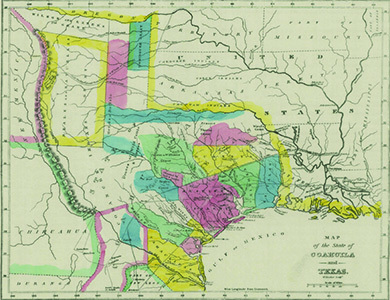| << Chapter < Page | Chapter >> Page > |
Many Americans who migrated to Texas at the invitation of the Mexican government did not completely shed their identity or loyalty to the United States. They brought American traditions and expectations with them (including, for many, the right to own slaves). For instance, the majority of these new settlers were Protestant, and though they were not required to attend the Catholic mass, Mexico’s prohibition on the public practice of other religions upset them and they routinely ignored it.
Accustomed to representative democracy, jury trials, and the defendant’s right to appear before a judge, the Anglo-American settlers in Texas also disliked the Mexican legal system, which provided for an initial hearing by an alcalde , an administrator who often combined the duties of mayor, judge, and law enforcement officer. The alcalde sent a written record of the proceeding to a judge in Saltillo, the state capital, who decided the outcome. Settlers also resented that at most two Texas representatives were allowed in the state legislature.
Their greatest source of discontent, though, was the Mexican government’s 1829 abolition of slavery. Most American settlers were from southern states, and many had brought slaves with them. Mexico tried to accommodate them by maintaining the fiction that the slaves were indentured servants. But American slaveholders in Texas distrusted the Mexican government and wanted Texas to be a new U.S. slave state. The dislike of most for Roman Catholicism (the prevailing religion of Mexico) and a widely held belief in American racial superiority led them generally to regard Mexicans as dishonest, ignorant, and backward.
Belief in their own superiority inspired some Texans to try to undermine the power of the Mexican government. When empresario Haden Edwards attempted to evict people who had settled his land grant before he gained title to it, the Mexican government nullified its agreement with him. Outraged, Edwards and a small party of men took prisoner the alcalde of Nacogdoches. The Mexican army marched to the town, and Edwards and his troop then declared the formation of the Republic of Fredonia between the Sabine and Rio Grande Rivers. To demonstrate loyalty to their adopted country, a force led by Stephen Austin hastened to Nacogdoches to support the Mexican army. Edwards’s revolt collapsed, and the revolutionaries fled Texas.
The growing presence of American settlers in Texas, their reluctance to abide by Mexican law, and their desire for independence caused the Mexican government to grow wary. In 1830, it forbade future U.S. immigration and increased its military presence in Texas. Settlers continued to stream illegally across the long border; by 1835, after immigration resumed, there were twenty thousand Anglo-Americans in Texas ( [link] ).


Notification Switch
Would you like to follow the 'U.s. history' conversation and receive update notifications?